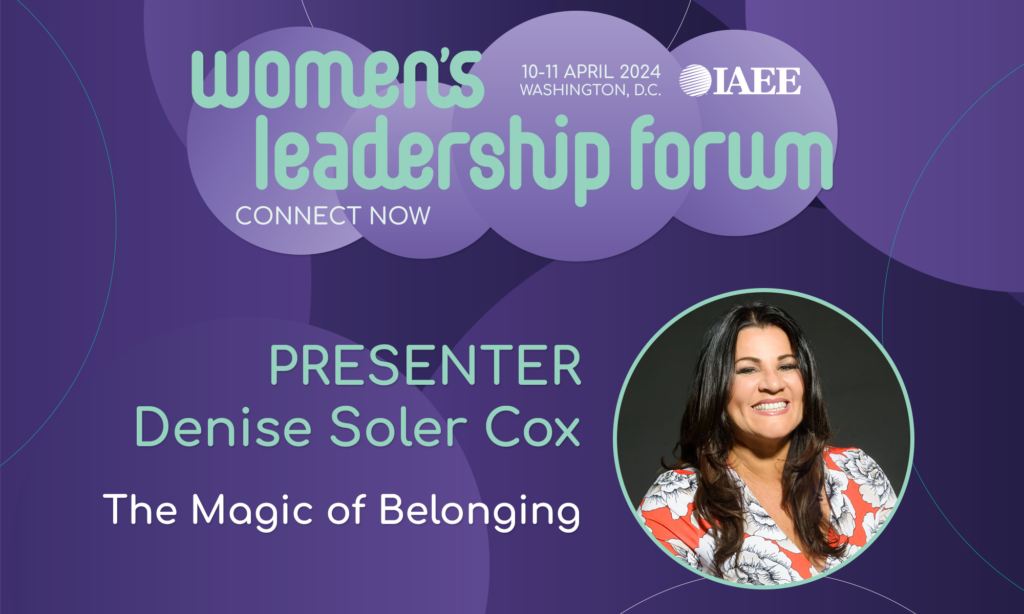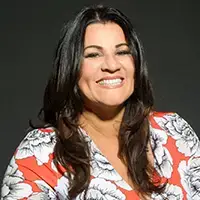By Mary Tucker | Sr. Communications & Content Manager | IAEE

After going from stay-at-home mom to award-winning activist filmmaker, Top 100 podcaster and sought-after international speaker, Denise Soler Cox uses her experience to produce inspiring content that sparks meaningful and transformative dialog. Her work inspires a more engaged, creative and productive workforce that can benefit from her simple-to-understand “Recipe for Belonging” which she will share in her session, The Magic of Belonging, at this year’s Women’s Leadership Forum on 10-11 April in Washington, D.C.
Denise co-produced and co-directed the award-winning film, “being eñye,” which revealed a foundational truth: Belonging is a universal human need. The worldwide audience reaction to her film reinforced her commitment to positively impacting individuals, companies and communities in transforming how they think about culture, identity and what it means to belong.
Her work with Project Eñye has been featured on NBC Nightly News, Forbes.com, CNN, NBC Latino, Chicago Tribune, Telemundo, Univision, Fox News Latino, HOLA and the Huffington Post. In 2020 Denise was recognized as a “Featured Host” by Apple Podcast North America for her podcast “The Self-ish Latina” which has listeners in 32 countries. Denise has been invited to speak on more than 400 stages including two TEDx talks and has worked with some of the world’s most recognized brands like L’Oréal, Progressive, Microsoft, AARP, Facebook, LinkedIn, JP Morgan Chase, Salesforce, Procter & Gamble, Dow Jones, Eli Lilly, KPMG, Starbucks, VaynerMedia and SONY, to name a few.
Denise’s research-driven program emphasizes why Belonging matters to us personally and collectively. It is not a typical talk about diversity, equity and inclusion (DEI). It is a powerful message that helps us form a unique human bond that signals we are part of a community – a place where we fit in, where we feel welcome and with people we want to be around.
Denise is a distinguished member of the 4th Cohort of the Stanford Latino Leaders Entrepreneur Program and was a National Association of Latino Independent Producers (NALIP) 2017 Fellow. She was honored to be selected as the 2018 recipient of the “Bridge Builder Award in Education” from the Virginia Hispanic Chamber of Commerce.
Denise graciously received the MPI 2023 President’s award for the Rocky Mountain Chapter.
She is working on a forthcoming book about Belonging.
Your story is remarkable in that you went from living an “ordinary” life to this extraordinary achievement that is resonating globally on so many levels. How did the realization that inspired this incredible shift happen and how do you cull the research that fuels your work?
Denise: Producing the film that ignited the work that I do was on my metaphorical dream board for 17 years before I took any kind of meaningful action toward making it real. I’ll admit that I’ve been hard on myself at times wishing I would have done something sooner so that I could have more time to do the meaningful work that I absolutely love. But I recently learned something profound that we as women often overlook, which is that I needed that time to “become” the woman that I needed to become so that I could make a film and eventually start a global movement around belonging.
We can be so impatient with ourselves and in that state of restlessness, we skip over the power of the smallest steps we’ve taken in the right direction.
Giving ourselves permission to take as long as we need to take and giving ourselves the grace to bloom in the areas we need and want to grow, is an essential part of our own story of “becoming.”
One day I woke up and I was ready, but there were a million moments of progress packed into the 17 years that lead up to that moment.
I keynoted an event at a hospital group in Boston a few years back, and while I can’t remember the question that was asked in the Q&A, the way I answered it minimized my expertise.
After the formal part of the program was over, a line of attendees formed straight up the aisle that separated the room into two parts. This is my absolute favorite part of any event because I love meeting the audience and hearing their stories, reactions, and what they took away from my presentation.
After 8 years of speaking and meeting people after the event, I’ve come to understand there are commonalities in the things people were sharing with me one-on-one. So much so that I’ve been able to have a much richer personal understanding of belonging than had I just made the film, although those interviews fueled a big part of my early insights as well.
A Ph.D. candidate waited patiently in that long line to tell me she loved my presentation but for one single thing.
She shared that while I was answering a question during the Q&A, I’d referred to these “many conversations” but that I’d minimized the research part. I reminded her that I’d done no formal research and that everything that I knew about the subject was in some way shape or form deduced from the volume of conversations I’ve had on the topic with audience members like her.
That’s when she stopped me and said:
“In my world Denise that’s called qualitative research. People do this in labs, you do it in places like this – same outcome, same learning.”
She made me promise to consider from that point forward to honor the work I do in belonging, by holding my qualitative findings in the highest regard. I’ll be the first to admit that it’s hard sometimes, but it’s the reason I’m so confident in what I share and why I can speak with so much certainty.
My understanding of belonging is culled from thousands of conversations over the last eight years and then is backed up by the latest research coming out of Harvard and Stanford.
It’s vitally important to tease out the volume of available research and make it real for people by putting it into language we can understand and teach about through story. Understanding something qualitatively is like a gift that keeps on giving.
Your work transcends viewpoints such as the “personal versus professional” conflict that many of us have. The idea that bringing your authentic self to work is not only okay, but owed to yourself and your organization, is one that can be intimidating to many. In what ways can people who struggle with this find the courage they need to successfully do it?
Denise: For nearly all my professional years (save the last 10) I believed that I had no choice but to manage two versions of myself. A personal version of me (the real me) and a professional version, a sanitized version of me.
As a first gen Latina, I’ve “code-switched” my entire life because there were some places and spaces where it felt unsafe to express my Latinidad. Professional spaces were often the places where I felt it better to leave my true identity at the door. I was excellent at compartmentalizing these parts of myself and had little awareness of how much it cost me until I began working on my film.
Now, because my film is about Latino identity and the inherent challenges that exist growing up as part of the Latino diaspora, the only way it worked was for me to intentionally collapse my dueling identities into one single authentic version of myself. This was easier than it sounds and was a source of great relief. The energy it takes to leave out a whole part of one’s identity is beyond draining.
Now because “being eñye” is an indie film, I found myself wearing multiple hats on set, and “Primary Interviewer” was one of the most intimidating roles in the production – I knew it had to be me asking the questions.
I got my feet wet playing a stoic interviewer with questions neatly planned out and clearly written on index cards in an order that seemed efficient and made sense to me. The cards approach was so bad because it minimized the natural back-and-forth that happens in all great interviews – the kind of back-and-forth that makes people trust you.
My results spoke for themselves – I left quite a bit to be desired as an interviewer and getting better required time we didn’t have.
The “professional” (read: impersonal) approach was simply not working. There’s a certain brand of professionalism that is simply not designed to foster authentic relationships where people feel safe sharing their fullest selves – in fact, it seemed to be designed to do the opposite.
I needed to change my approach.
I decided to change my tactics and went for what I call the “Making a new friend” approach. This tactic had me thinking about what would make someone feel safe around me and want to trust me, and ultimately feel comfortable confiding in me in the contrived environment of a studio with the heat of the lights beating on them, a boom mic hovering above our heads and two cameras pointed directly in our face.
Being a terrible interviewer was ground zero for this most powerful revelation.
In order to get the best interview, I needed to embrace authenticity at its deepest level and share the inherent conflicts and challenges I experienced personally, so that my subjects felt safe to share their lived experiences with me.
Creating a safe environment for them meant that I had to forgo the antiquated ideas around what it means to be “professional” and adopt and embrace something new.
This was as hard as it sounds but it got easier.
Here’s what I learned.
The more “me” I was on set, in the editing room, in screening rooms, and on stage, the better everything worked. I was happier, felt more creative, and more connected to others than I’d ever been in my life personally and professionally.
For the first time, I felt like I belonged to my work and to the beautiful team of collaborators around me.
Now that I’m on the other side of that experience, there’s no turning back for me. Belonging is non-negotiable – I have to feel it or it’s just not my place.
Now I get hired by clients who also care deeply about belonging and get to speak to audiences that get revved up about it too. A big part of what works so well is my willingness to be as authentic as I can be on stage to set the example of the frequency we need to be in to invite the truest versions of ourselves to the space. Magic happens here.
You also challenge organizations to see past the formula that has been in place for so long in order to cultivate a corporate culture that not only benefits their teams but the company. What have you found holds top executives back from this process and what feedback have you received from those who have implemented a successful culture of Belonging in their organizations?
Denise: Fear holds all of us humans back, including the top executives.
No one wants to feel foolish, or like they overshared. Sharing with the tippy top of leadership that their ability to be authentic is the mitigating factor in creating belonging brings up a lot of fear for people.
Some wonder why can’t we go back to “the good old days” when we didn’t need to create spaces for people to belong because people were grateful to have work.
That kind of thinking is the way of Blockbuster when they turned down the offer from Netflix. It’s antiquated and dangerous.
The research is irrefutable, belonging is good for business. Brands need to understand that they have two customers now, their employees and the people who buy what they sell – both need to feel like they belong and when they do, the sky isn’t even the limit.
You have created an impactful and fulfilling career from an idea that many may have overlooked as a life-changing opportunity or perhaps been overwhelmed by the process of developing it. What would you tell someone who feels that they have an amazing concept but aren’t sure about pursuing it?
Denise: I would say what are you waiting for?! Life is too short to wonder what could have been.
Also, everything that happened after the movie was made is the part I could have not imagined. It’s the extra credit, the stuff that makes my work sweet and so meaningful to me because it’s wholly inspired by the community of supporters who share with me what they want (to feel like they belong) and then invite me to teach them what I’ve learned. It’s a great honor for me and I pinch myself often because being able to be my true self at work and belonging to a cause that has deep personal meaning to me is a life well lived.
You genuinely connect with people and capture the essence of Belonging, which is at the heart of your message and your work. What makes Belonging such a key factor in the human experience?
Denise: Research tells us that the feeling of belonging ranks right behind oxygen on the level of importance it has to being human.
Additionally, when we experience belonging uncertainty, the physical pain center lights up in our brain which is one of the most compelling pieces of evidence pointing toward the importance of creating belonging-centered spaces.
All the data is pointing in a single direction and ten years of experience gathering stories from people from all walks of life are saying the same thing.
Belonging-centered approaches are not only good for business and they are good for people.


